SNP leadership: The battle raging for the party's soul
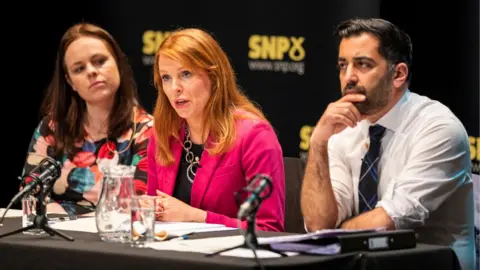 PA Media
PA MediaBBC Scotland is set to host the latest debate between the three candidates to lead the SNP. Kate Forbes, Ash Regan and Humza Yousaf will answer audience questions in Edinburgh, in a race which has exposed old divisions.

It was an occasion of real political drama, a moment when it seemed the Scottish National Party might tear itself apart.
"Those of us who put Scotland and the party above narrow personal or political obsessions cannot and will not tolerate behaviour which is divisive and harmful," thundered the SNP leader in a fiery speech.
Immediately, a group of rebel SNP members strode out of the hall in protest; raucous jeers, cheers and applause ringing in their ears.
This is not a description of the latest leadership hustings but of the SNP's 1982 conference in Ayr.
The leader was Gordon Wilson; the rebels subsequently expelled from the party included a young Alex Salmond; and their demand was for the SNP to embrace a vision of Scotland as a socialist republic.
Now, four decades later, old fissures are opening up again, with heated debate about the party's direction of travel on economics, independence and social issues.
All this is unfolding in a very different political landscape.
Having run Scotland's devolved government since 2007, the SNP of today is vastly bigger, slicker, and more successful than it was when it had only two MPs in the early '80s.
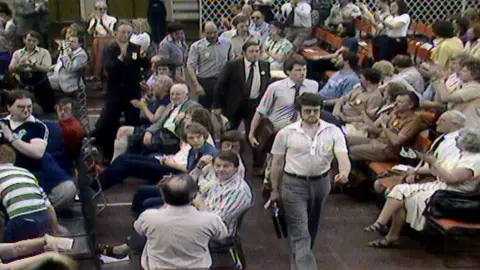
A new generation of nationalist politicians - Kate Forbes, Ash Regan and Humza Yousaf - are not only competing for the party crown, but also to become the sixth first minister of Scotland since powers over health, education and other domestic issues were devolved from London to Edinburgh in 1999.
Neither Ms Forbes nor Mr Yousaf were born at the time of the Ayr affair. Ms Regan was at primary school.
For much of their adult lives, their party has been known for its extraordinary public unity and iron political discipline, first under Mr Salmond and then, following Scotland's rejection of independence in the 2014 referendum, under Nicola Sturgeon.
But trouble was brewing well before Ms Sturgeon announced her shock resignation last month, triggering the leadership contest.
Her ministry had been under pressure on economics from both left and right; on independence from frustrated members of both the SNP and Mr Salmond's breakaway Alba Party; and on gender reform from critics led by the Harry Potter author JK Rowling.
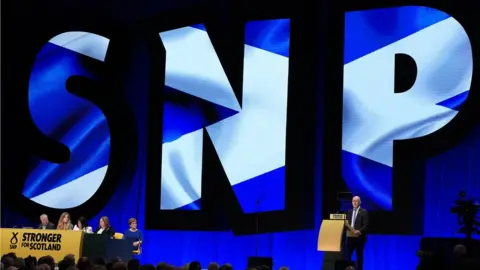 PA Media
PA MediaFirst, the economics. Since bringing the Scottish Green Party into government two years ago to support her minority administration, the first minister had been accused of indulging an anti-growth agenda.
This was allegedly exemplified by her rejection of new drilling for oil and gas, the imposition on business of an unpopular bottle recycling scheme, and plans to curb alcohol advertising.
Despite raising taxes on the richest Scots, the SNP leader was also accused by the left of cosying up to capitalists.
Jonathon Shafi, the author of a pro-independence newsletter called Independence Captured, argues that the SNP has been "captured by corporate lobbyists".
He accuses the Scottish government of embracing neoliberal economic policies which prioritise capital over labour by, for example, flogging off national green energy resources on the cheap, and forming an alliance with the Conservatives to create freeports, which he derides as "tax havens".
Ms Sturgeon rejects such criticism but economic issues have been a key part of the campaign so far.

Who are the SNP leadership candidates?

A special edition of the Debate Night programme will air at 20:00 on BBC One Scotland. The candidates will face questions from an audience of voters from across the political spectrum in Edinburgh.
The debate, hosted Stephen Jardine, will also be streamed live on the BBC News website and on BBC iPlayer.

Kate Forbes, currently on maternity leave from her role as finance secretary, is often described as the most business-friendly contender, although she stresses that she champions growth for a purpose: to secure independence and end poverty.
Ms Forbes has described the bottle return scheme as having the potential to cause "economic carnage". She argues that after Covid, Brexit, and energy price hikes, firms should be given "a bit of breathing space".
Mr Yousaf and Ms Regan have also expressed reservations about the scheme, and all three candidates have raised concerns about the potential impact of a proposed advertising ban on Scotland's £5.5bn whisky industry.
If either Ms Forbes or Ms Regan is victorious, the power-sharing deal with the Greens would appear to be in jeopardy while Mr Yousaf is generally seen as the continuity candidate, a position which has opened him up to the kind of attacks rarely seen since the intra-party warfare of the 1980s.
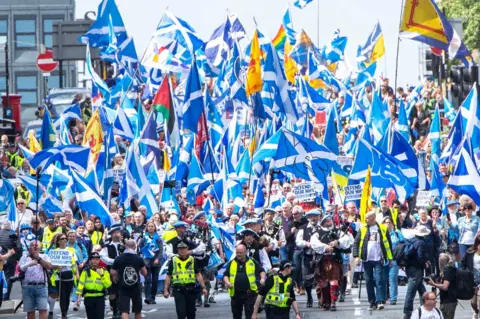 PA Media
PA MediaWhen Ms Forbes used a debate televised by STV to trash Mr Yousaf's record as transport minister, justice secretary and health secretary, it felt like a lid had blown off a simmering pot.
"More of the same is not a manifesto," said Ms Forbes, "it's an acceptance of mediocrity."
In the next debate, hosted by Channel 4 News, Mr Yousaf hit back, accusing his rival of being the Conservatives' favoured candidate.
The Scottish Tories, he claimed, were "rooting for you to win".
Labour senses an opportunity here, both for Sir Keir Starmer's attempts to win the keys to 10 Downing Street in London and for Anas Sarwar's ambition to one day move into the first minister's official residence, Bute House in Edinburgh.
In Monday's Sky News debate all three candidates said that in the event of a hung parliament at Westminster they would, in theory, prop up a minority Labour government in return for the formal transfer to Holyrood of the power to hold a second referendum on independence, a deal which Sir Keir has repeatedly insisted he would not strike under any circumstances.
And in an attempt to win back voters Labour have lost to the SNP, the party's sole MP in Scotland, Ian Murray, who represents Edinburgh South, has resurrected the old "Tartan Tory" label which was often applied to the SNP under Gordon Wilson.
 PA Media
PA MediaHe has accused Ms Forbes of right-wing economics, even though her plan to grow the economy to invest in public services has distinct echoes of New Labour.
What, though, of the national question? Here too there is division and discord, as well as potential opportunity.
"As Albert Camus said: 'Freedom is nothing but a chance to do better'," said Steve Norris, convener of the SNP's Kirkcudbright and District branch in the south west of Scotland.
He regards this leadership election as probably the most important in the party's history.
He is impressed with Ms Forbes, describing her as "honest, straight, true and brimful of integrity".
Mr Norris is also complimentary about Ms Regan, saying: "She's got her own ideas about how we achieve our march towards independence and that has attracted a lot of members...to her side."
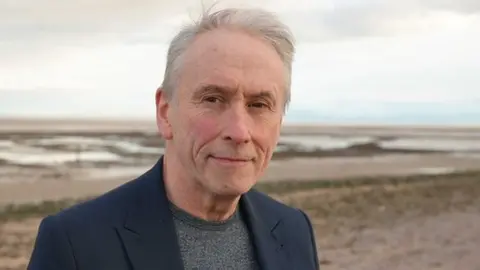
Crucially, those ideas do not involve holding another referendum on leaving the UK.
Instead Ms Regan would treat all future Westminster and Holyrood elections as referendums in all but name. If at any point pro-independence parties polled more than 50% of the vote, Ms Regan says this would constitute a mandate to open negotiations with London.
"The ballot box is the gold standard of democracy," she says - insisting that if the UK government at first refused to enter talks, international outrage would force it to climb down, a claim rejected by both Labour and the Tories.
In the meantime, the MSP for Edinburgh Eastern says that as first minister she would focus on running the Scottish government, with work on preparing for secession devolved to an Independence Convention and an Independence Commission.
At a hustings in Fife, Ms Regan suggested that voters could be alerted to the moment "we've solved" all of the problems standing in the way of independence by means of a public installation in Glasgow or Edinburgh to be known as a Readiness Thermometer.
The current temperature of the thermometer is unclear, although by Ms Regan's own logic it is presumably not yet hot enough for independence.
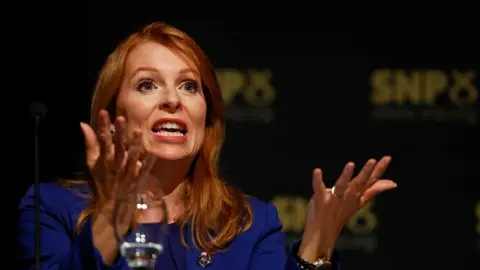 PA Media
PA MediaMs Forbes' approach to the issue is at once fast and slow.
Fast because she has pledged to, somehow, obtain the power from Westminster to hold a referendum within three months of winning a majority at the next Westminster election.
Slow because she says independence will only be secured by winning over undecided voters through a strategy of patient competence.
"We maximise that support through good governance; a growing, thriving economy; a mission to eradicate poverty; and demonstrating that Scotland's better days are ahead with independence," says the MSP for Skye, Lochaber and Badenoch.
Mr Yousaf's message is not dissimilar. "Don't get bogged down in process," he argues. Focus on making the case for independence, and the path will become clear.
He has distanced himself from the controversial policy, which appears to have contributed to Ms Sturgeon's downfall, of turning the next general election into a de facto referendum on independence, stating over and over that he's "not wedded to it".
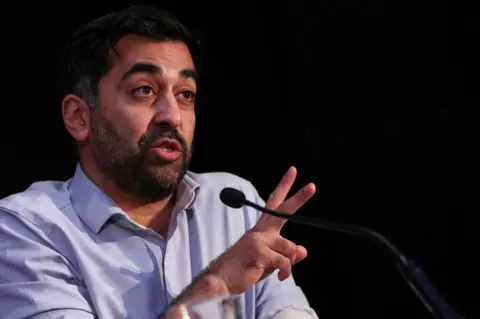 Reuters
ReutersThe MSP for Glasgow Pollok is dismissive of the notion that Westminster would agree to begin independence negotiations in the event of pro-independence parties winning more than 50% of the vote in a general election.
"When we need to get them on a phone call they don't even bloody come on the phone, right, let alone telling them to come up the road and demanding that they take part in negotiations," he said.
Mr Yousaf has a similarly blunt assessment of Westminster on the other big issue which has split the SNP - gender.
"There's a fundamental principle here about our democracy which is under attack," he told me on the day of his campaign launch.
To recap, briefly: in December, after a lengthy and fractious process, the Scottish Parliament approved legislation which would have lowered from 18 to 16 the age at which someone could change the sex on their birth certificate, as well as removing medical and administrative hurdles to doing so.
Ms Regan had resigned on principle as community safety minister rather than vote for the law, which she opposed.
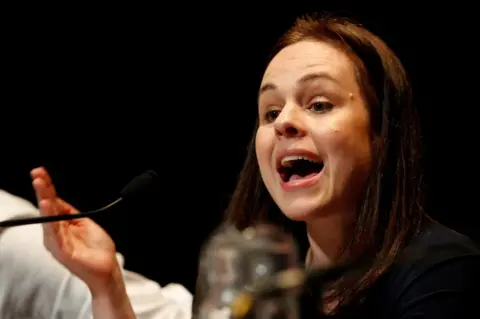 PA Media
PA MediaThen, arguing that the Scottish bill contravened Britain's Equality Act by making it harder to exclude people born biologically male from women-only spaces, the UK government took the unprecedented step of blocking it from receiving royal assent.
Ms Forbes - who told me that she too would have voted against the law, had she not been on maternity leave at the time - said she was "loath" to challenge Rishi Sunak's government on the matter in court, instead suggesting that the conflict could be solved by Holyrood amending the legislation.
Ms Regan is not convinced that is possible. She proposes dropping the bill and sending the issue of gender to a citizens' assembly for consideration.
Mr Yousaf diverges dramatically from the other two candidates on this point though, insisting it is vital to take the case to court.
"There's a fundamental principle here about our democracy which is under attack," he told me. This argument is rejected by the UK government, which insists it is acting entirely properly within the structures of the Scotland Act which established devolution.
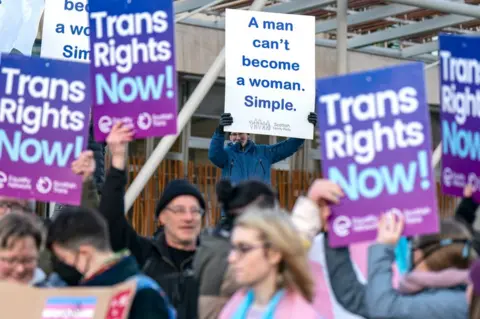 PA Media
PA MediaThis is not the only social issue roiling the campaign.
Ms Forbes, a member of the Calvinist Free Church of Scotland, has attracted strong criticism for saying she would have voted against gay marriage had she been a politician at the time it became law in 2014.
Her stance has also attracted some praise.
"I actually really commend her for her honesty," says Alec Ross, an SNP member who owns an agricultural business in Stranraer.
Mr Yousaf, who is a Muslim, has denied that he dodged the final vote on the subject in 2014 for religious reasons.
Despite Kate Forbes insisting that she would defend the hard-won rights of any minority, including gay people, a slew of SNP parliamentarians deserted her campaign, leaving Mr Yousaf heavily favoured by the party establishment, including the key figure of Deputy First Minister John Swinney.
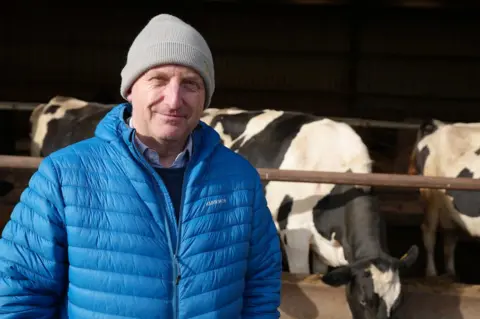
This has led supporters of the two women in the race to cry foul, claiming that the hierarchy is doing all it can to stitch up the contest for Mr Yousaf.
They point to the case of South of Scotland MSP Emma Harper, who broke the rules by using her party email address to campaign for the health secretary.
Màiri McAllan, the environment, biodiversity and land reform minister who is often tipped as a future SNP leader herself, and who is backing Mr Yousaf, denies any foul play, pointing out that Ms Harper's email privileges were suspended as a result.
"I think the fact that the parliamentary group has largely supported Humza is much more about his record and what his vision is for the party and for Scotland than anything to do with any conspiracies," she told me.
To distinguish the party from Labour and the Conservatives, she adds: "It's more important than ever that the SNP is that centre-left, socially democratic progressive party."
Forty-one years after the stushie in Ayr the battle continues to rage for the SNP's cultural, political, and economic soul.
